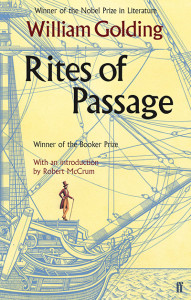On 21st October 1980, forty years ago today, William Golding was awarded the Booker Prize for Rites of Passage. Golding was 69 and until 2019, when the Booker Prize was shared between Bernardine Evaristo and Margaret Atwood (aged 79), he had been the oldest winner of the award. The other books shortlisted in 1980 were Anthony Burgess, Earthly Powers, J L Carr, A Month in the Country, Anita Desai, Clear Light of Day, Alice Munro, The Beggar Maid, Julia O’Faolain, No Country for Young Men, and Barry Unsworth, Pascali’s Island. Golding was understandably thrilled to be nominated but also nervous and wrote in his journal that he ‘spent the night evolving angry speeches of rejection or acceptance of the Booker’!
The Booker Prize was established in 1969 and as the years went on, the prize attracted more publicity. Katy Stoddard, in the Guardian, described the 1980 contest as ‘perhaps the biggest literary battle’ in the prize’s history. Golding and Burgess were two literary heavyweights and the clear favourites for the prize. In his journal, Golding commented on the media coverage: ‘The Booker thing keeps being referred to – this morning Anthony Burgess and I are said to be front runners’. Golding admired Burgess’s writing and said in an interview in 1982 that Burgess is ‘a man of immense energy and fertility’.
The night of the prizegiving has gone down in literary history. Anthony Burgess declared that he would only attend the ceremony if he was guaranteed to win the award. The organisers refused to give him advance notice of the winner, and he stayed in his hotel. Golding was announced as the winner and judge Claire Tomalin recalled that when the announcement was made, she ‘saw a tear trickle down Golding’s cheek’. He celebrated exuberantly and had rather too much to drink. John Carey notes that ‘John Spiers, of the Harvester Press, got a less elevated glimpse of the victor: “I went to the loo […] and William Golding, who’d clearly had a lot to drink, came in, fell flat on his face and said “F***”.’ In his journal Golding wrote ‘and so it happened! We have won the Booker Prize!’ In his report on the prize, W L Webb called Golding the ‘Lord of the novel’ and opined that Rites of Passage showed him at the ‘height of his powers’.
Golding’s joy at winning the Booker Prize was elevated due to the difficulties he’d had both personally, and professionally, in the previous years. Golding suffered from writer’s block and alcoholism throughout the 1970s and in that time, he had wondered whether he would ever write another novel. The Pyramid, published in 1967, received mixed reviews, which certainly had an impact on him and between 1967 and 1979, the only published fictional work was The Scorpion God, a collection of three novellas. Golding was working on two manuscripts during this time, although they both went through numerous drafts and versions. In a stunning return to form, Darkness Visible was published in 1979, won the James Tait Black prize and was probably considered for the Booker shortlist. The award of the 1980 prize for Rites of Passage helped to alleviate what Golding called his ‘crisis’ and the book eventually became the first of a hugely successful trilogy, adapted by the BBC.
Amazingly, Golding’s wife Ann predicted his forthcoming success. Judy Golding remembers
‘When Darkness Visible won the James Tait Black award, my father reacted superstitiously, refusing to show pleasure or pride in case they presaged a fall, as my grandmother might have hinted. My mother was dishing up the supper.
“Come on,” she said. “This year the James Tait Black. Next year the Booker. Then the Nobel Prize”.’
Golding was awarded the Nobel Prize for literature in 1983.



